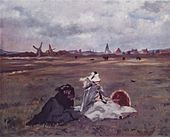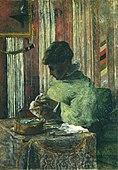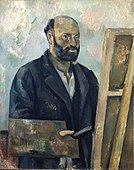Foundation E. G. Bührle
Collections
Although the collection includes a number of Old Masters and Modern art including works by Pierre Bonnard, Georges Braque, Henri Matisse, and Pablo Picasso, it comprises mainly French Impressionism and Post-Impressionism paintings by Paul Cézanne, Edgar Degas, Paul Gauguin, Édouard Manet, Claude Monet, Camille Pissarro, Pierre-Auguste Renoir, Georges Seurat, Alfred Sisley, Henri de Toulouse-Lautrec, Vincent van Gogh and others.
Connections to Nazi Germany
Bührle bought his gothic sculptures in the shop of Benno Griebert, a member of Hitler's party NSDAP and ardent Nazi supporter. Bührle was only able to acquire his art collection with profits from the sale of weapons worth 623 million francs to Adolf Hitler's army. The arms business with the Nazis made him the richest man in Switzerland.
Gallery
-
Jean-Baptiste-Camille Corot, A Girl Reading, 1845–1850
-
Édouard Manet, The Swallows, 1873
-
Édouard Manet, The Suicide, 1877–1881
-
Paul Signac, Two Milliners in the Rue du Caire, 1885–1886
-
Paul Gauguin, The Embroiderer (La Brodeuse), 1880
-
Vincent van Gogh, The Sower (after Millet), 1888
-
Paul Cézanne, Self-Portrait with Palette, 1890
-
Henri de Toulouse-Lautrec, Messaline, 1900–1901
-
Amedeo Modigliani, Reclining Nude, 1916
Art theft
On 10 February 2008, four paintings worth CHF 180 million ($162.5 million) were stolen from the museum. The four paintings were: Cézanne's Boy in the Red Vest (1894/1895), Degas's Count Lepic and His Daughters (1871), Monet's Poppies near Vétheuil (1879) and Van Gogh's Blossoming Chestnut Branches (1890).
-
Paul Cézanne, The Boy in the Red Vest, oil on canvas, 1894/1895
-
Edgar Degas, Count Lepic and His Daughters, 1871
-
Claude Monet, Poppies near Vétheuil, 1879
-
Vincent van Gogh, Blossoming Chestnut Branches, 1890
All four paintings were eventually recovered. Monet's Poppies near Vétheuil and Van Gogh's Blossoming Chestnut Branches were recovered on February 18, 2008 in a car parked in the parking lot of a nearby hospital. Cézanne's Boy in the Red Vest was recovered in Serbia on April 12, 2012. Count Lepic and His Daughters was recovered in April 2012 with slight damage. In 2012, three men were arrested in connection with the theft.
The "Bührle Black Book" controversy
In a 2015 publication entitled The Bührle Black Book, Thomas Buomberger and Guido Magnaguagno called for an investigation into Nazi era provenance gaps in a number of paintings in the Bührle collection. The Foundation had been working with provenance researcher Laurie A Stein since 2002 to update the ownership history of the collection and to publish it online.
References
- ^ Illien, Noele (22 November 2021). "Kunsthaus Zurich: Looted art claims pose questions for Swiss museum". BBC News.
- ^ Erich Keller:The Contaminated Museum, 2021 .
- ^ "Stiftung Sammlung E. G. Bührle | Wir begrüssen Sie auf unserer Website". Buehrle.ch. Retrieved 2012-07-22.
- ^ Erich Keller:Das Kontaminierte Museum2021.
- ^ "Four masterpieces stolen from Zurich museum (ref.: 2008/5583)". Interpol.com. Archived from the original on 2020-04-13. Retrieved 2008-02-14.
- ^ Harnischfeger, Uta and Nicholas Kulish (February 12, 2008). "At Zurich Museum, a Theft of 4 Masterworks". The New York Times. Retrieved 2011-04-21.
- ^ "Four Paintings Were Stolen". Outpost Art. Archived from the original on 2015-06-30. Retrieved 2015-06-22.
- ^ swissinfo.ch, S. W. I.; Corporation, a branch of the Swiss Broadcasting (27 April 2012). "Stolen Degas recovered damaged". SWI swissinfo.ch. Retrieved 2019-08-30.
- ^ "BBC News – Stolen Cezanne found by Serbian police". Bbc.co.uk. 2012-04-12. Retrieved 2012-07-22.
- ^ Thomas Buomberger, Guido Magnaguagno (eds): Schwarzbuch Bührle: Raubkunst für das Kunsthaus Zürich? Rotpunkt, Zürich 2015, ISBN 978-3-85869-664-9
- ^ Carvajal, Doreen (2016-03-03). "Plan for Nazi-Era Arms Dealer's Collection Sets Off Backlash at Zurich Museum". The New York Times. ISSN 0362-4331. Retrieved 2017-04-18.
- ^ Villarreal, Ignacio. "New book raises questions about weapons dealer E.G. Buehrle's Nazi-era art". artdaily.com. Retrieved 2017-04-18.
- ^ swissinfo.ch, Ariane Gigon. "A new look at Bührle art collection's shadowy past". SWI swissinfo.ch. Retrieved 2017-04-18.
- ^ "Provenance research". Foundation E. G. Bührle Collection. Retrieved 15 July 2021.
Further reading
- Gloor, Lukas (ed.): Stiftung Sammlung E. G. Bührle: Katalog I–III. Silvana 2004–2005, ISBN 88-87582-95-5 (1), ISBN 88-87582-88-2 (2), ISBN 88-87582-73-4 (3).
- Gloor, Lukas: Bührle collection : Impressionist masterpieces from the E.G.Buehrle collection, Zurich (Switzerland). Tokyo: The National Art Center (2018). OCLC 1089128887.
- Emil Maurer: Stiftung Sammlung E. G. Bührle, Zürich. Bern 1992 ISBN 3-85782-526-X
- Katalog Washington D.C.: The Passionate Eye, Impressionist and other Master Paintings from the E. G. Bührle Collection. Zürich 1990 ISBN 0-8478-1215-4
External links
- Official webpage in German and in English
- Complete list of artists in the Bührle Foundation's collection













